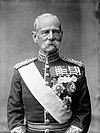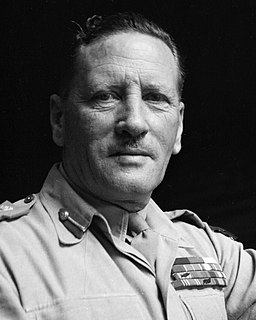
Field Marshal Sir Claude John Eyre Auchinleck, was a British Army commander during the Second World War. He was a career soldier who spent much of his military career in India, where he rose to become Commander-in-Chief of the Indian Army by early 1941. In July 1941 he was appointed Commander-in-Chief of the Middle East Theatre, but after initial successes, the war in North Africa turned against the British, and he was relieved of the post in 1942 during the crucial Alamein campaign.

Field Marshal Henry Maitland Wilson, 1st Baron Wilson,, also known as Jumbo Wilson, was a senior British Army officer of the 20th century. He saw active service in the Second Boer War and then during the First World War on the Somme and at Passchendaele. During the Second World War he served as General Officer Commanding-in-Chief (GOC-in-C) British Troops in Egypt, in which role he launched Operation Compass, attacking Italian forces with considerable success, in December 1940. He went on to be Military Governor of Cyrenaica in February 1941, commanding a Commonwealth expeditionary force to Greece in April 1941 and General Officer Commanding (GOC) British Forces in Palestine and Trans-Jordan in May 1941.

Field Marshal Hugh Gough, 1st Viscount Gough, was an Irish officer of the British Army. After serving as a junior officer at the seizure of the Cape of Good Hope during the French Revolutionary Wars, Gough commanded the 2nd Battalion of the 87th Regiment of Foot during the Peninsular War. After serving as commander-in-chief of the British forces in China during the First Opium War, he became Commander-in-Chief, India and led the British forces in action against the Marathas defeating them decisively at the conclusion of the Gwalior Campaign and then commanded the troops that defeated the Sikhs during both the First Anglo-Sikh War and the Second Anglo-Sikh War.

The Chief of the General Staff (CGS) has been the title of the professional head of the British Army since 1964. The CGS is a member of both the Chiefs of Staff Committee and the Army Board. Prior to 1964, the title was Chief of the Imperial General Staff (CIGS). Since 1959, the post has been immediately subordinate to the Chief of the Defence Staff, the post held by the professional head of the British Armed Forces.
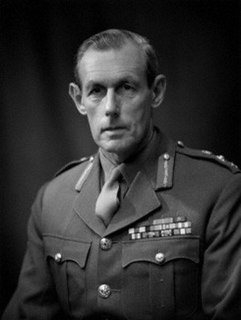
Field Marshal Richard Michael Power Carver, Baron Carver, was a senior British Army officer. Lord Carver served as the Chief of the General Staff (CGS), the professional head of the British Army, and then as the Chief of the Defence Staff (CDS), the professional head of the British Armed Forces. He served during the Second World War and organised the administration of British forces deployed in response to the Mau Mau Uprising in Kenya and later in his career provided advice to the British government on the response to the early stages of The Troubles in Northern Ireland.
Field Marshal Sir Roland Christopher Gibbs, was Chief of the General Staff, the professional head of the British Army, from 1976 to 1979, and Lord Lieutenant of Wiltshire from 1989 to 1996. He saw active service in the Second World War and acted as chief of staff to the commander of the operation to evacuate all British troops and civilians from Aden during the Aden Emergency.
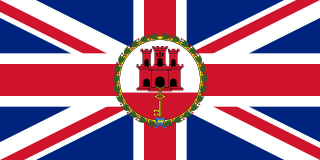
Field Marshal Sir John Lyon Chapple, was a British Army officer who served as Chief of the General Staff, the professional head of the British Army, from 1988 to 1992. Early in his military career he saw action during the Malayan Emergency and again during the Indonesia–Malaysia confrontation and later in his career he provided advice to the British Government during the Gulf War.

Field Marshal Michael John Dawson Walker, Baron Walker of Aldringham, is a retired British Army officer. Commissioned in 1966, he served in Cyprus, Northern Ireland, and in a variety of staff posts in the United Kingdom until 1984. After being given command of a battalion, he was mentioned in despatches for his service during a second tour of duty in Northern Ireland, this time in Derry, and subsequently served a tour on Gibraltar. He was promoted to brigadier, unusually having never held the rank of colonel, and took command of 20th Armoured Brigade in Germany before becoming I Corps chief of staff.

Admiral of the Fleet Sir Reginald Yorke Tyrwhitt, 1st Baronet, was a Royal Navy officer. During the First World War he served as commander of the Harwich Force. He led a supporting naval force of 31 destroyers and two cruisers at the Battle of Heligoland Bight in August 1914, in which action the 1st Battlecruiser Squadron under Sir David Beatty sank three German cruisers and one German destroyer with minimal loss of allied warships. Tyrwhitt also led the British naval forces during the Cuxhaven Raid in December 1914, when British seaplanes destroyed German Zeppelin airships and at the Battle of Dogger Bank in January 1915, in which action Tyrwhitt again supported Beatty's powerful battlecruiser squadron.

Admiral of the Fleet John David Elliott Fieldhouse, Baron Fieldhouse, was a Royal Navy officer. He commanded five submarines and a frigate before achieving higher command from the 1970s. Following the invasion of the Falkland Islands by Argentine forces in April 1982, Fieldhouse was appointed Commander of the Task Force given responsibility for "Operation Corporate", the mission to recover the Falkland Islands. The campaign ended in the surrender of Argentine forces in June 1982. He became First Sea Lord and Chief of Naval Staff in December that year and, in that role, persuaded the British Government to fund the replacement of ships lost in the Falklands War. He went on to be Chief of the Defence Staff from 1985 until his retirement in 1988.

Admiral of the Fleet Terence Thornton Lewin, Baron Lewin, was a Royal Navy officer. He served in the Second World War and then commanded a destroyer, the Royal yacht, two frigates and an aircraft carrier before achieving higher command. He was First Sea Lord and Chief of the Naval Staff in the late 1970s and in that role he worked hard to secure a decent wage for servicemen and helped win them a 32% pay rise. He went on to be Chief of the Defence Staff during the Falklands War, serving as chief war planner and as Prime Minister Margaret Thatcher's chief advisor during the war. He was also the first Chief of Defence Staff to act as head of the Armed Forces rather than just Chairman of the Chiefs of Staff Committee.

Marshal of the Royal Air Force Graham Eric Stirrup, Baron Stirrup,, informally known as Jock Stirrup, is a former senior Royal Air Force commander who was the Chief of the Defence Staff from 2006 until his retirement in late 2010. He is now a Crossbench member of the House of Lords. In April 2013, he was appointed a Knight of the Order of the Garter by Queen Elizabeth II.

General John Nicholas Reynolds Houghton, Baron Houghton of Richmond, is a retired senior British Army officer and former Chief of the Defence Staff (CDS) of the British Armed Forces. He was appointed CDS in July 2013, following the retirement of General Sir David Richards. He served as Commanding Officer of the 1st Battalion, the Green Howards in Northern Ireland during The Troubles and later became Commander of the 39th Infantry Brigade in Northern Ireland. He deployed as Senior British Military Representative and Deputy Commanding General, Multi-National Force – Iraq during the Iraq War. Later, he became Chief of Joint Operations at Permanent Joint Headquarters and served as Vice-Chief of the Defence Staff until assuming the position of CDS. Houghton retired from the British Army in July 2016, and was succeeded as CDS by Air Chief Marshal Sir Stuart Peach.

General David Julian Richards, Baron Richards of Herstmonceux, is a retired senior British Army officer who was formerly the Chief of the Defence Staff, the professional head of the British Armed Forces. He succeeded Air Chief Marshal Sir Jock Stirrup in this role on 29 October 2010.

General Francis Richard Dannatt, Baron Dannatt, is a retired senior British Army officer and member of the House of Lords. He was Chief of the General Staff from 2006 to 2009.

Admiral Sir John David Luce, was a Royal Navy officer. He fought in the Second World War as a submarine commander before taking part in the Dieppe Raid and becoming Chief Staff Officer to the Naval Forces for the Normandy landings. He also commanded a cruiser during the Korean War. He served as First Sea Lord and Chief of the Naval Staff in the mid-1960s and in that role resigned from the Royal Navy along with Navy Minister Christopher Mayhew in March 1966 in protest over the decision by the Labour Secretary of State for Defence, Denis Healey, to cancel the CVA-01 aircraft carrier programme.

Field Marshal Sir Frederick Paul Haines was a British Army officer. He fought in the First Anglo-Sikh War, in the Second Anglo-Sikh War and then in the Crimean War: during the latter conflict at the Battle of Inkerman, he held an important barrier on the post road guarding the approach to the 2nd Division camp for six hours. He served in India during the Indian Rebellion before becoming Commanding Officer of the 8th Regiment of Foot in the United Kingdom and then Commander of a Brigade in Ireland. He went on to be General Officer Commanding the Mysore Division of the Madras Army and then Quartermaster-General to the Forces in the United Kingdom. He returned to India to become Commander-in-Chief of the Madras Army in May 1871 and then Commander-in-Chief, India in April 1876: he commanded the forces in India during the Second Anglo-Afghan War and successfully argued for a large force being made available before mobilisation occurred, but once the war started the Governor-General of India, Lord Lytton, was inclined to by-pass Haines and deal direct with commanders in the field, causing friction between the two men.

General Sir Charles Frederic Keightley, was a senior British Army officer who served during and following the Second World War. After serving with distinction during the Second World War – becoming, in 1944, the youngest corps commander in the British Army – he had a distinguished postwar career and was the Governor of Gibraltar from 1958 to 1962.
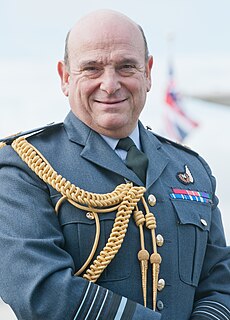
Air Chief Marshal Sir Stuart William Peach, is a senior Royal Air Force officer. After training as a navigator, Peach commanded IX (Bomber) Squadron and then became Deputy Station Commander RAF Bruggen. He was deployed as NATO Air Commander (Forward) in Kosovo in 2000. He went on to be Chief of Defence Intelligence in 2006, Chief of Joint Operations in 2009 and the first Commander of Joint Forces Command in December 2011 before being appointed Vice-Chief of the Defence Staff in May 2013. Peach succeeded General Sir Nick Houghton as Chief of the Defence Staff on 14 July 2016. He succeeded General Petr Pavel as Chairman of the NATO Military Committee on 29 June 2018, serving as such until his retirement from NATO in June 2021.

General Sir Mark Alexander Popham Carleton-Smith, is a senior British Army officer. He became Chief of the General Staff in June 2018, succeeding General Sir Nick Carter. He has previously served as Director Special Forces and commanded 22 Special Air Service Regiment.

